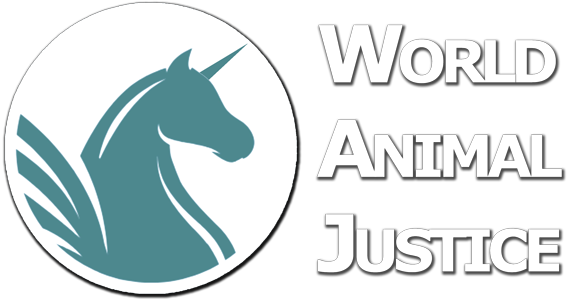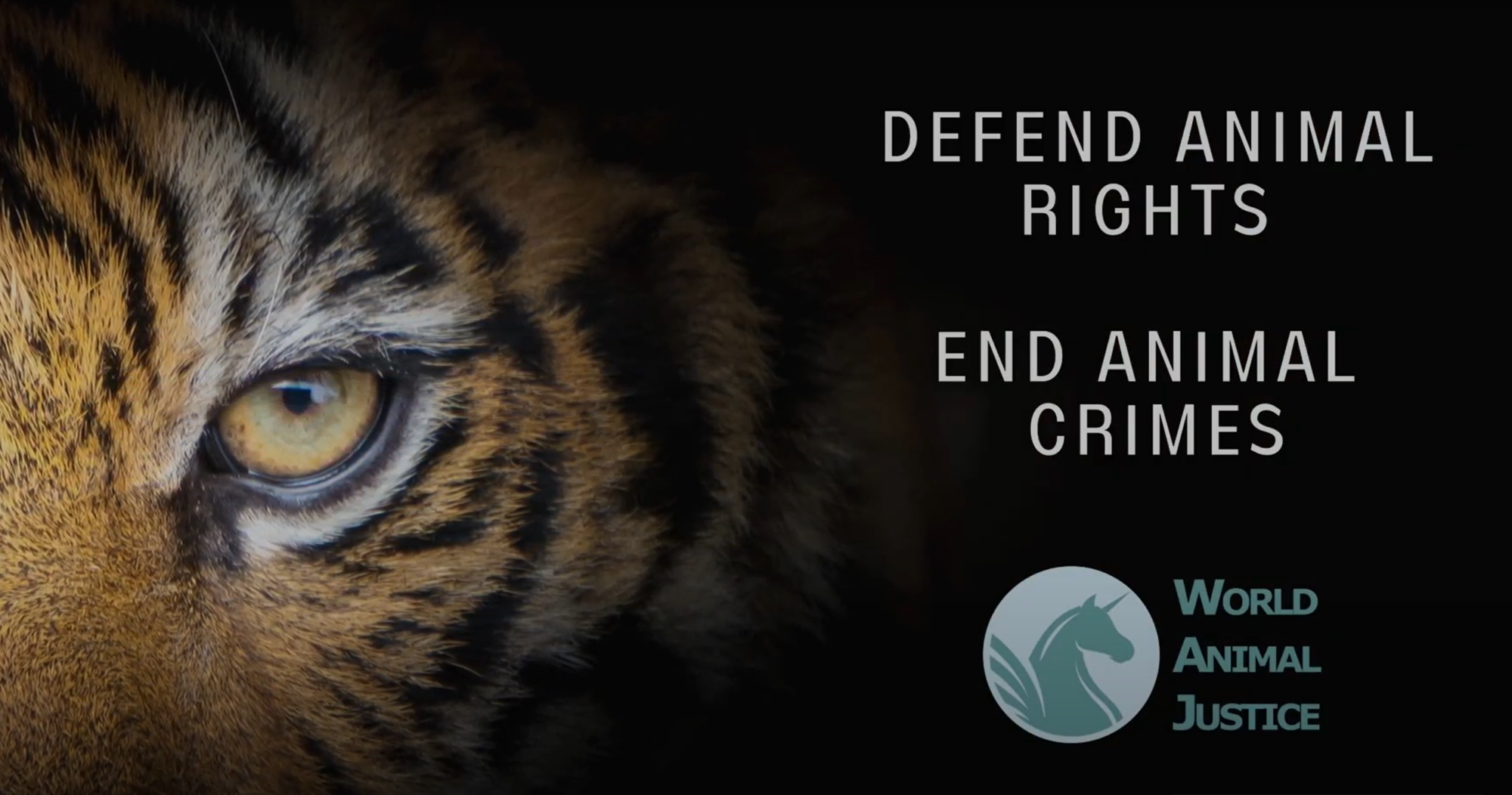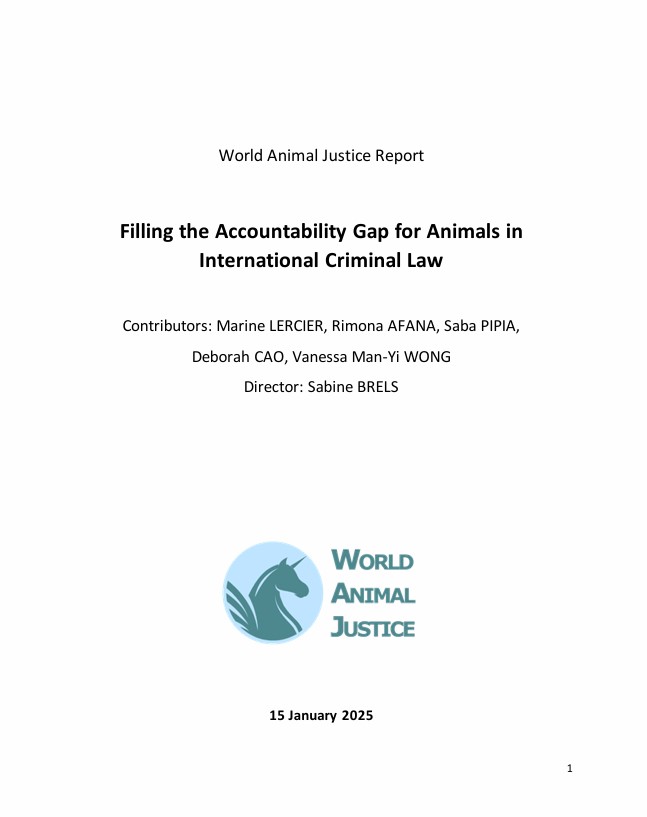Unveiling WAJ Landmark Report: Experts' Proposals on 'Crimes against Animality' in International Law
In a groundbreaking advocacy move to advance the legal protection of animals globally, the World Animal Justice (WAJ) organization has released a groundbreaking report titled: “Filling the Accountability Gap for Animals in International Criminal Law”. This pivotal report introduces the concept of “crimes against animality” and outlines key experts’ proposals for addressing the widespread and systematic abuse of animals through international legal reforms.
A First Step Toward Justice for All Sentient Beings
For centuries, animals have suffered as the invisible victims of human activities, ranging from industrial exploitation to the atrocities of war. Despite growing recognition of animal sentience and rights, gaps in International Criminal Law (ICL) persist, leaving billions of animals without meaningful legal protection. This report marks a significant step in filling those gaps.
Initiated and led by WAJ director Sabine Brels, this report results from the key contributions and proposals made by a distinguished group of international animal and criminal law experts, knowing: Marine Lercier, Rimona Afana, Saba Pipia, Deborah Cao and Vanessa Man-Yi Wong.
In sum, this key report is both a comprehensive legal analysis and a compelling call to action.
-> Explore the insights and unique expertise of these WAJ Experts by watching their previous WAJ Expert Webinars.
Bridging the Accountability Gap
Currently, international criminal law does not cover animals and animal protection is too often overlooked. Even in conflict zones, animals are treated as collateral damages or property, but not as victims of such atrocities. This WAJ report underscores the interconnectedness between human, environmental, and animal rights, advocating for holistic reforms that recognize animals as sentient beings with fundamental rights.
Key Recommendations
This report outlines a series of 7 preliminary recommendations by WAJ experts to strengthen international legal protections for animals.
They aim to address the gaps in current international legal frameworks by advocating for the recognition of crimes against animals as serious international offenses, expanding the legal definition of victims, and promoting broader accountability for harm to animals in the contexts of both peacetime and armed conflicts. Through innovative legal mechanisms, dynamic interpretations of existing provisions, and global advocacy, these measures strive to establish solid foundations for advancing animal protection and ensuring justice for all sentient beings.
Core Proposal: Crimes Against Animality in International Law
Amongst the 7 key recommendations made in this Report, its core proposal to recognize “crimes against animality” under international law. Mirroring “crimes against humanity” in the Rome Statute of the International Criminal Court (ICC), it gives birth to this novel concept.
Indeed, it suggests that ‘crimes against animality’ can become a new core crime under international criminal law to address the widespread and systematic harm or exploitation of animal populations carried out as part of a state or organizational policy. Modeled on ‘crimes against humanity’, this definition encompasses acts such as mass killings (e.g., industrial slaughter, poaching), severe confinement, forced labor, inhumane transport, torture, sexual violence (e.g., forced pregnancies in dairy industries), and other cruel practices causing significant physical or psychological harm. This innovative legal framework seeks to protect animals from severe suffering and exploitation globally and marks a crucial step toward recognizing their fundamental interests under international law.
By criminalizing such acts, WAJ aims to bring justice to animal beings, ensuring accountability and legal considerations on a global scale.
Including Animals in Ethical and Environmental Imperatives
The WAJ report places animal justice at the forefront and within a broader ethical and environmental framework. By recognizing the shared vulnerabilities of humans, animals, and ecosystems, the report emphasizes the urgent need for systemic change. From factory farming’s environmental toll to the role of wildlife trafficking in organized crime, the report paints a vivid picture of how protecting animals advances global stability, lasting sustainability, and ultimately justice for all.
A Call to Action
WAJ’s vision extends beyond theoretical frameworks. The organization’s mission is to establish a new paradigm in international law, ensuring that crimes against animals are treated with a similar gravity than crimes against humanity. This milestone report is only the beginning of WAJ’s advocacy efforts to achieve universal interspecies justice.
Join the Movement
As the world faces unprecedented challenges, it is now time to protect animals who still remain the missing piece of the global justice puzzle.
Visit World Animal Justice to learn more about our work. Your support is essential to pursue our mission to end crimes against animality.
Together, we can create a just world for all sentient beings.
Keywords: International Criminal Law, Animal Rights, Crimes Against Animality, Rome Statute, Environmental Justice, Global Animal Advocacy.



